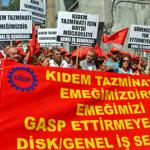* Photos: AA, Pixabay, DİSK
Guaranteed by the law since 1936, severance pay is one of the longest-established acquired rights of the working class in Turkey. However, especially for the last 20 years, which - not coincidentally - concurs with the ruling Justice and Development Party (AKP) governments, it has also been one of the much-debated issues on the public agenda.
Most recently, on June 17, President and ruling AKP Chair Recep Tayyip Erdoğan and Minister of Family, Labor and Social Services Zehra Zümrüt Selçuk had a meeting with Union of Chambers and Commodity Exchanges of Turkey (TOBB) Chair Rifat Hisarcıklıoğlu, Confederation of Employers' Unions of Turkey (TİSK) Chair Özgür Burak Akyol, Confederation of Turkish Trade Unions (TÜRK-İŞ) Chair Ergün Atalay and HAK-İŞ Trade Union Confederation Chair Mahmut Arslan in the capital Ankara.
While this meeting of three parties, namely the representatives of the state, employers and employees, excluded the Confederation of Progressive Trade Unions of Turkey (DİSK), which has long been known for its oppositional stance towards subsequent governments, the subject of the meeting was the so-called Supplementary Pension System (TES), a proposed system that also foresees fundamental changes to be introduced to the current regime of severance payment.
Before this meeting took place, there had already been speculations and debates about the issue, especially in the media. Amid these debates, the Chairs of the TÜRK-İŞ and the DİSK separately announced that their response to such a change would be a general strike.
But what does the current Labor Law in Turkey say about severance pay? What does the government propose? Why do workers and unions - despite their deeply-rooted disagreements about several other issues - object to this proposed system together? Here is a brief summary.
A brief history: One of the first gains of workers
Within the context of Turkey, severance pay refers to the compensation that the employers are obligated to pay to their employees in the event that they end their job contracts for reasons listed in the Labor Law.
In expressing the objections of her confederation to the planned changes, DİSK Chair Arzu Çerkezoğlu is frequently heard to be saying that "severance payment is the longest-established acquired right of the working class of Turkey with almost 90 years of history."
As rightly pointed out by Çerkezoğlu, severance payment has been a part of working life in Turkey since the 1930s. Published on the Official Gazette on June 15, 1936, the Labor Law no. 3008 guaranteed workers' right to severance pay in Turkey for the first time.
Even though it is different than the current law in terms of its content, it still marks the beginning of severance pay in the country.
The current system of severance payment
In the current context, severance pay is governed by the Article 14 of the Labor Law no. 1475, which entered into force on September 1, 1971.
While all provisions of this law have been outlawed by the enactment of the Labor law no. 4857, the Article 14 of the Law no. 1475 is still in force by virtue of the Article 120 and provisional Article 6 of the Law no. 4857.
Against this legal background, employers are to pay employees a severance pay equal to their 30-day salary for one year in following cases:
* If the employer terminates the contract for reasons other than the ones specified in the Article 25 of the Labor Law no. 4857;
* If the employee terminates the contract for reasons specified in the Article 24 of the above law, namely, for reasons of health, for immoral, dishonorable or malicious conduct or other similar behavior and force majeure;
* Due to compulsory military service;
* In order for the employees to receive an old age pension, pension fund or invalidity pension or to receive a full payment from the statutory institutions or retirement funds to which they are affiliated;
* In the event that women dissolve the work contract voluntarily within a year beginning from the date of marriage;
* In case of employees' death.
While the same law also stipulates that this payment shall be made on the basis of the same proportion for periods exceeding one year, employees qualify for severance pay when they work at the same or different workplaces of an employer at least for one year.
What does the government propose?
Despite being so hotly debated especially over the last two weeks, the details of the changes to be introduced to the current regime of severance payment or the establishment of a possible Supplementary Pension System (TES) have not yet been officially announced.
Speaking to BBC Turkish on June 26, the Chairs of the TÜRK-İŞ, HAK-İŞ and DİSK confederations have concurred that they have not yet received any drafts elaborating on the details of such a change. They have also said that "they are making inferences from the news reported in the press and the details shared by the [state-run] Anadolu Agency (AA)."
Thus, it seems safe to argue that much of the information as well as discussions and speculations about the issue have been so far shared with the public through the state-run or pro-government media outlets.
As reported the AA, some details from the TES system are as follows:
* The system is expected to enter into force on January 1, 2022. All employees of the private sector will be a part of this mixed TES system.
* In the current system, a worker receives 8.33 percent of his or her gross monthly salary as a severance pay. The TES system, on the other hand, foresees that 3 percent of this payment will be deposited into an individual fund account as employer's contribution and the worker will be entitled to a severance payment of 5.33 percent.
* In the event that the worker resigns, his or her right to receive this 3 percent deposited in the fund account will be reserved.
* If the worker is employed over a year or the work contract is terminated over immoral, dishonorable or malicious conduct, 50 percent of the employers' contributions and state subsidy that have accumulated in the fund will be reserved in the individual fund account of the employee while the remaining 50 percent will be transferred to the TES insurance account.
* While 19 days of a 30-day month will be subjected to severance payment, the remaining 11 days will accumulate in the individual fund account.
* A worker will retire at the age of 60. After retirement, he or she will receive up to 25 percent of the amount that has accumulated in the individual fund account as a lump sum payment while the remaining 75 percent will be paid back in monthly installments added to the pension.
'Why cannot you solve this among yourselves?'
In his most recent statement about the issue on June 27, President and AKP Chair Erdoğan has said that "what they want to do is to find a radical solution to the problems of employees" so that "workers' right of severance pay can be protected without being left to the mercy of some people."
President Erdoğan has also called on the labor unions and employers' unions to "come together and solve the issue."
"Why cannot you solve this issue among yourselves," he has asked the unions and added, "If you cannot solve it among yourselves, are you trying to put us in a tight spot in the eyes of workers and employees?"
But what do the unions say about these planned changes?
'It is our red line': Why do unions object?
When these planned changes to the current system of severance pay were brought up in early June, none of the labor unions seemed much surprised as it is an issue frequently brought into public agenda by the government, which has long been eager to transfer this acquired right to a fund.
This time, despite their deeply-rooted disagreements about several other issues, the confederations of trade unions, especially the TÜRK-İŞ and DİSK, have clearly expressed their objections, underlining that severance pay is their "red line" that had better not be crossed and threatening general strike if the system is put into effect despite their objections.
'If no severance payment, then no need for unions'
TÜRK-İŞ Chair Ergün Atalay, who is occasionally criticized for his concessions to the government especially in collective bargaining processes, addressed the reporters following a Board of Chairs meeting on June 26.
In referring to the planned changes, Ergün Atalay has said, "If severance pay is abolished, then, who needs me to sit here? Who needs the TÜRK-İŞ administration to be here? If there is no severance payment, there is a need for neither unions nor unionism."
Underlining that "the arrangement to be introduced is not in favor of employees, who do not have such a request anyway," Atalay has further stressed that severance payment is "the most important security for workers" in addition to being the "central pillar for work life."
Reminding that such arrangements are "brought into agenda in different names and with changes every year," he has called on the government to "enf such initiatives that will cause loss of rights on the part of workers."
"Severance pay is the red line of both the working class of Turkey and that of the TÜRK-İŞ," Atalay has protested further and added, "Strike or a general strike is not something that we really enjoy or that we are happy about, but we do not have any other choice."
Accordingly, Atalay has announced that as of today (June 29), they will hold statements for the press with the participation of their regional and provincial representatives in all 81 provinces across Turkey.
'It will promote flexible-precarious employment'
Excluded from this process almost all together, the DİSK also released a written statement following its Board of Chairs meeting on June 24.
Referring to the planned changes as "an attempt to abolish severance pay, which is the longest-established acquired right of the working class in Turkey for almost ninety years," the DİSK statement has briefly read as follows:
"They want to abolish the right of severance pay by transferring it to a fund under the name of Supplementary Pension System on the one side and by promoting flexible-precarious employment, especially for the workers younger than 25 and older than 50, on the other.
"There is nothing to negotiate about such plans that will ensure that severance pay will no longer be a responsibility for the employer, that will make dismissals easier by putting an end to its function as a job security for workers, that will give the employer an opportunity to act arbitrarily in the course of work and that will decrease the amount of severance pay by breaking its connection with the last salary. Fund means usurping our severance pay, accumulated labor and future.
"The only thing to discuss about severance payment is to reinforce and strengthen the existing system, to arrange it in such a way that all workers will be entitled to severance pay even if they work for a day or resign and to ensure that the state will appeal to the rule of law when employers do not give workers their severance pay.
"The DİSK Board of Chairs, once again, reiterates its determination and will and warns the government: Severance pay is our red line! A 'red line' means that it is an area that one cannot possibly overstep and the working class will not allow its severance pay to be touched in one way or another."
On June 26, the DİSK has announced that there will be events and statements for the press against the attempts to transfer the severance pay to a fund in all workplaces where the DİSK is organized.
"The final declaration of the DİSK as to the severance pay will be read out with the participation of tens of thousands of workers in hundreds of workplaces where we are organized in 81 provinces on June 29," the DİSK has stated. The DİSK Executive Board members, Board of Chairs, union administrators, regional and provincial representatives will also hold events and statements for the press in factories and workplaces.
'It shouldn't be debated amid pandemic'
Lastly, speaking about the planned changes on June 21, HAK-İŞ Chair Mahmut Arslan has indicated that "there are some shortcomings in the current system of severance payment," noting that any changes to the system need to be introduced in such a way that no step will be taken back from the acquired rights and all workers will be included.
"While the economic and social hardships are still ongoing in our country in the period of outbreak, we do not think that it is suitable to debate the issue of severance pay," Arslan has underlined further. (SD)











.jpg)
